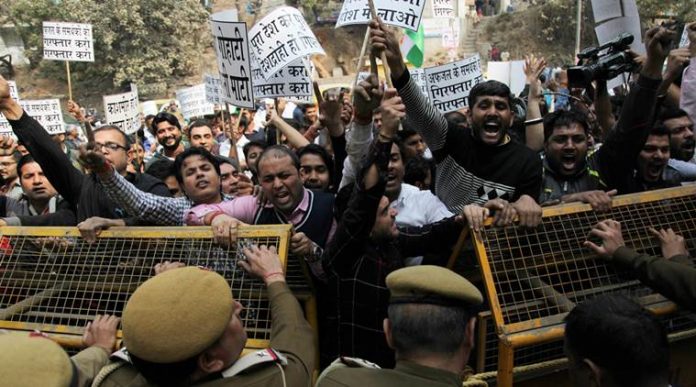Between 2014 and 2016, Indian police registered 112 cases of sedition nationwide, but convictions have been secured in only two cases, a National Crime Records Bureau report has revealed.
The annual Crime in India report released by National Crime Records Bureau has shown that 35 cases of sedition were filed in 2016. With 12 cases, Haryana is at the top. Most of these cases are related to the 2016 Jat agitation for reservation in educational institutions and jobs .
Delhi has two registered cases. The first relates to the Jawaharlal Nehru University clash in February 2016 regarding an event held on the death anniversary of Afzal Guru, which resulted in the arrest of student union leader Kanhaiya Kumar and others. The second is with respect to a meeting held at the Press Club of India in Delhi the very next day at which reportedly anti-Indian slogans were raised. Delhi University professor SAR Gilani, the convenor of the event was charged with sedition.
In 2015, 30 cases of sedition were reported while in the previous year 47 had been recorded.
The National Crime Records Bureau began the practice of separating out charges against the state into specific categories only in 2014.
Slow Rate of Case Disposal By Police
In terms of cases that reach the chargesheet state, the Bureau report doesn’t contain data for 2014. However in 2015, six cases reached the chargesheet stage while in 2016 it was 16.
A chargesheet is the document prepared by the police that details out the accusations against an individual post registration of a FIR or First Information Report
Even if all the 22 cases registered in the two years of 2015 and 2016 were chargesheeted in the same years, it implies a very slow rate of disposal by the police. According to senior lawyers, this is a disadvantage for the defendants as it allows a greater scope for authorities to harass the defendants.
According to senior advocate Sanjay Hegde, the main reason for low conviction rates in sedition cases is because “the law is misapplied”. Stating that the law has become a tool for harassment, he said that the authorities charge a person without thinking on the possible course of action, which results in the case not standing up in a court of law.
- Six cases of sedition were dropped by the police in 2014 citing lack of evidence while two were designated as false according to the Bureau report.
- In 2015, trials related to four sedition cases were completed with all of them ending in acquittals for the accused.
- In 2016, of the three trials involving sedition charges , two ended in acquittals and one in a conviction. All other cases are pending trial.
Understanding Law of Sedition
Under Section 124A of the Indian Penal Code punishment for sedition could result in life imprisonment.
It describes an offender as one who:
- by words, spoken or written, or
- by signs, or
- by visible representation
brings or attempts to bring “hatred or contempt, or excites or attempts to excite disaffection, towards the government established by the law in India. “
The law exempts any comments disapproving administrative actions of the government as a means to change them without aiming to “excite hatred, contempt or disaffection”.
But the interpretation of the law by local authorities has been controversial.
Interpretation of Sedition Law Faulty
Senior advocate Prashant Bhushan pointed out that only an act of violence that seeks to “overthrow the government qualifies as a case of sedition”. But today authorities use the law to charge people for “comments on social media and even celebrations after cricket matches”.
Such cases where the law is often employed as “a tool of harassment” are weak in court resulting in low convictions.





